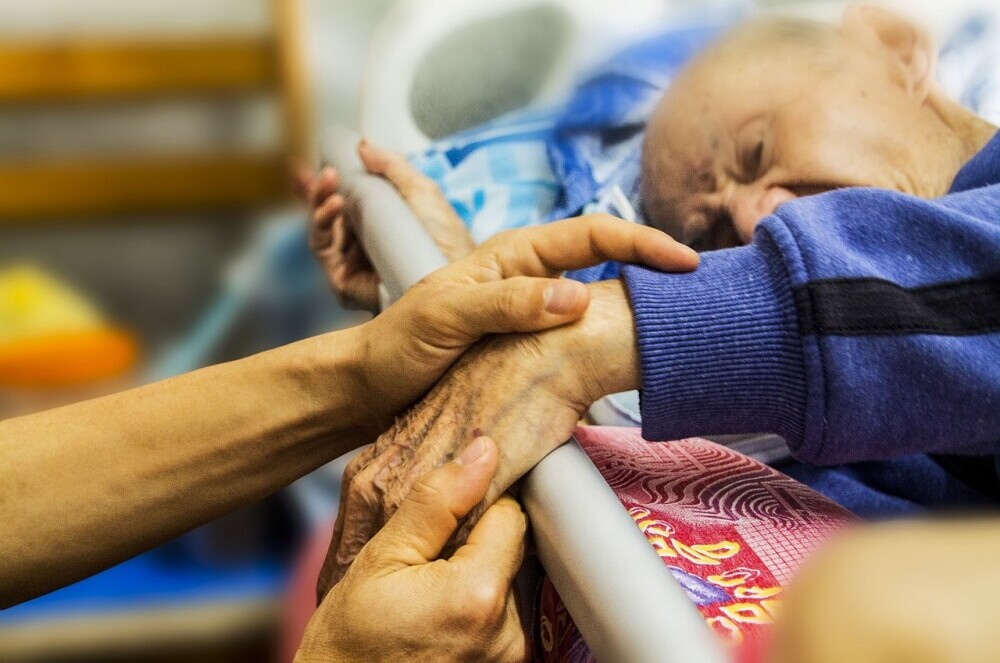End-of-life care is a comprehensive approach tailored to meet the medical, emotional, and spiritual needs of individuals during the final stages of life.
It includes managing physical symptoms in addition to providing comfort and dignity. This type of care encompasses various services and support systems designed to improve the quality of life for both the individual and their family.

Primary Goals of End-of-Life Care
The primary goals of end-of-life care are to ensure comfort and dignity. This often involves pain management, emotional support, and addressing any spiritual concerns a person might have.
The focus is on making the patient’s last days as peaceful and meaningful as possible while providing the family with the support they need.
There are different services and care options available, including palliative care and hospice care.
Palliative care can be started at any stage of illness and is not limited to those who are at the end of their life. It aims at relieving symptoms and stress of the illness, improving the quality of life.
Hospice care is typically for those who are nearing the end and focuses on providing comfort rather than attempting to cure the illness.
Healthcare providers and care teams play a crucial role in end-of-life care. These teams often consist of doctors, nurses, counselors, and spiritual advisors who work together to create a comprehensive care plan.
They are there to:
- Manage symptoms
- Provide emotional support
- And help navigate the often complicated healthcare system.
Their expertise and compassion are invaluable for both the patient and their loved ones during this challenging time.
Communicating About End-of-Life Care
Transparent communication is key in end-of-life care. Open and honest discussions help everyone involved understand the patient’s wishes and ensure those wishes are respected. It can be tough to start these conversations, but being open from the beginning can make a significant difference.
Discussing preferences and advanced directives is an important aspect of planning.
Advanced directives are legal documents that detail a person’s wishes regarding medical treatment if they’re unable to communicate them. Having these documents in place can take a lot of stress off family members as they make decisions that align with their loved one’s desires.
Including family members and loved ones in these discussions is essential. Their support and understanding are crucial during these times, and involving them can help create a more supportive environment for the patient. It’s important to listen to their concerns and suggestions as well, as they are often deeply affected by these decisions.
Cultural and ethical considerations can impact end-of-life communication. Different families and individuals have varying beliefs and values that influence their decisions. Being aware and respectful of these differences can help ensure that care aligns with the patient’s and family’s values.
This might include managing language barriers, religious beliefs, or other cultural norms that influence healthcare decisions.
Holistic Approaches in End-of-Life Care
A holistic approach in end-of-life care considers the whole person, addressing not just physical symptoms, but also emotional and spiritual needs. This comprehensive care model aims to improve the overall well-being and quality of life for both the patient and their family.
Managing pain and relieving symptoms are central to ensuring comfort. Effective pain management can significantly enhance a person’s quality of life in their final days.
This might involve medications, physical therapies, or alternative treatments like acupuncture. The goal is to find the most effective combination that works for the individual.
Emotional support is also a key component of holistic care. End-of-life can bring up a lot of complex emotions, not just for the patient but for their loved ones too.
Counseling and mental health support play a vital role in helping everyone navigate these feelings. Group therapy, individual counseling, or simply having a counselor available for talks can make a big difference.
Supportive therapies are another important aspect to consider. These therapies can include:
- Music therapy
- Art therapy
- Or even pet therapy, offering comfort and emotional relief.
Such therapies help in creating moments of joy and peace, making the journey a bit easier for everyone involved.
Hospice and palliative care also fall under the umbrella of holistic approaches. While hospice care is more focused on those in their final stages, palliative care can be provided at any stage of illness.
Both aim to enhance quality of life, whether through medical treatment, emotional support, or spiritual guidance.
Planning and Support for Families
Planning and support for families are vital components of end-of-life care. It’s a difficult time, and having the right resources and networks in place can make a big difference. Knowing where to look for help is the first step.
Various resources and support networks are available to assist families. Local hospitals and care centers often provide information about support groups, counseling services, and other resources designed to help families cope during this time.
Online communities and forums can also offer advice and emotional support. There is also support through educational films and literature.
Financial and legal planning is another area that families need to address. Ensuring that legal documents, such as wills and power of attorney, are in order can alleviate stress and prevent potential disputes.
It’s a good idea to consult with a legal advisor who specializes in end-of-life matters to ensure everything is handled properly.
Bereavement and grief support are just as important. Losing a loved one is incredibly challenging, and professional grief counseling or support groups can provide much-needed comfort. Seeking out these services early can help families prepare for the emotional aftermath of loss.
Personal stories and testimonials can be incredibly valuable. Hearing from others who have gone through similar experiences can offer insights and reassurance. Films, books, articles, and online testimonials can provide useful perspectives and tips on navigating this difficult journey.
Conclusion | Care and Support
Navigating the complexities of end-of-life care requires the following:
- Thoughtful planning
- Clear communication
- And a supportive network.
Finally, end-of-life care plays a vital role in ensuring dignity and comfort for the elderly during their final days by:
- Addressing medical needs
- Managing symptoms
- And offering emotional and spiritual guidance,
With the right resources, families can find the educational support they need to make informed decisions, creating an environment of peace, compassion, and understanding during this profound life stage.
You or someone you know may benefit from this article, “End of Life Care for the Elderly | Find Educational Support.” Please feel free to share your thoughts, questions, or comments below. I’d love to hear from you and will be happy to respond.
Veron | Entrepreneur | The Way 4WordEnterprises

Hi,
This blog has a special place in my heart, as it probably does for many. I was the one most equipped to help my mother through end of life. She lived 500 miles away, and there was no way we could bring her to us. She and her husband were first in a residential care, but then they had to leave that because of my mom’s mobility and her husband’s diagnosis of cancer and dementia. They moved into a skilled nursing and memory care home.
They were both on hospice, and it was the best group of people that I could imagine. They were wonderful with communication with me. They provided all the care my mom and stepfather needed. They assisted in getting a sitting service for them, which turned into 24-hour service for my mom, 7 days per week because I knew the nurses couldn’t be in the room that often. They had a chaplain. They cared about my emotional needs through it. The folks ended up passing within 6 months of each other, her husband dying first.
End of life care was so important for us and we had a wonderful group of people that came along side to help during a very difficult time. Great article!
– Scott
Hi Scott:
Thank you for taking the time to read my article and share your heart-warming story from a first-hand point of view. I’m sorry that you lost your mom and stepdad in that manner. But, how wonderful to have an excellent team of people to come alongside to help in that regard!
All types of resources are available, and as a caregiver for more than 18 years, I’m happy to serve and bring awareness in whatever way I can.
Veron